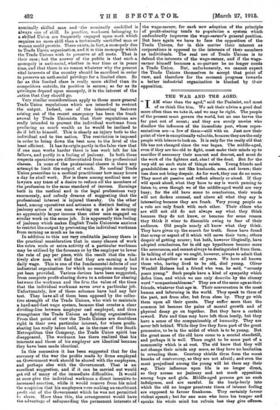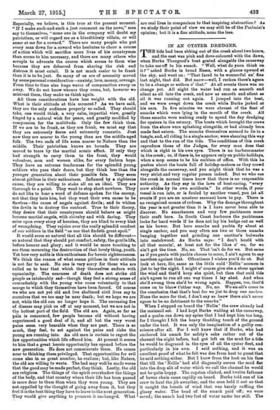THE WAR AND THE AGED.
T AM wiser than the aged," said the Psalmist, and most I- of us think like him. We ask their advice a good deal more often than we take it, and we may be right. The people of the present must govern the world, but no one leaves the far past oat of count; and they are surely unwise who disallow the influence of the immediate past, whose repre- sentatives are—a few of them—still with us. Just now their point of view is exceptionally valuable, because they are the only people with leieure to look on. It is only for the really old that life has not changed since the was begun. The middle-aged, even if they are too old to fight, must make their minds up to sacrifice if necessary their nearest and dearest., and must do the work of the fighters and, des I. of the dead. But for the very old no each state of things exists. Young friends and grandchildren are not like husbands, eons, and lovers; their loss does not bring despair. As for work, they can do no more. They must sit passive and reflect silently or aloud. If they will speak aloud, what they have to any is worth pausing to listen to, even though we of the middle-aged world are very busy; for the old have come to conclusions, their words will not darken counsel, and above all what they say is interesting because they are frank. Very young people as a rule are only frank with each other. Their elders who are still not old do not always say what they think because they do not know, or because for some reason they think it wiser to dissemble owing to fear of their audience. Old people nearly all know what they think. They have given up the search for truth. Some have found that scrap or aspect of it which will serve their turn; others despair of getting nearer; but both, however illogically, have adopted conclusions, for in old age hypotheses become more like assurances, and cannot always be distinguished from them. In talking of old age we ought, however, always to admit that it is not altogether a matter of years. We have all known those who, having lived to be old, died young. Oliver Wendell Holmes had a friend who was, be said, "seventy years young." Such people have a kind of sympathy which defies time, and which we can only describe by the clumsy word " companionableness." They are of the same age as their friends, whatever that age is. Their conversation is the most human and informing in the world. They speak to them of the past, not from afar, but from close by. They go with them upon all their quests. They suffer more than the common lot because the pains of mental growth and of physical decay go on together. But they have a certain reward. Fate and time may have left them lonely, but they have a sense of the companionship of humanity. They are never left behind. While they live they form part of the great procession, to be in the midst of which is to be young. But the great mass of the old have come to a mental standstill, and perhaps it is well. There ought to be some part of a community which is at rest. The old know that they will not change their minds any more, so they have no hesitation in revealing them. Courtesy shields them from the worst knocks of controversy, so they are not afraid; and even the most prejudiced among the young will let them say their say. Their influence upon life is no longer direct, so they arouse no jealousy and not much opposition among boys and girls. Middle-aged persons get no such indulgence, and are careful. In the harly.burly into which the old no longer penetrate times of intense feeling are supposed to favour frankness. They certainly favour violent speech; but for one man who loses his temper and speaks his whole mind ten. refrain lest they give offence. Especially, we believe, is this true at the present moment. "If I make such-and-such a just comment on the news," men say to themselves, "some one in the company will doubt my patriotism, or will regard me as a bloodthirsty villain, or will sneer at me for a coward." There are many people who put every man down for a coward who hesitates to cheer a course of action which will sacrifice more lives of his countrymen than seems to him necessary, and there are many others who scruple to advocate the course which seems to them wise because they are debarred from sharing the risk and distress it must entail. It is not much easier to be frank than it is to be just. So many of us are of necessity moved by some personal consideration—anxiety, love, money, revenge. From time to time also huge wares of compunction sweep us away. We do not know whence they come, but, however we mistrust them, they make us think again.
All these considerations have leas weight with the old. What is their attitude at this moment P As we have said, they are the only audience properly so called. They should take, one would think, a very calm, impartial view, greatly tinged by a natural wish for peace, and greatly modified by compassion for the multitude. Only the few think thus. If we are to be frank, 8A they are frank, we must say that they are extremely fierce and extremely romantic. Just now they are nearer to the young than are the middle-aged folk. The two ends of life seem nearer to Nature than the middle. Their patriotism knows no bounds. They are moved to tears by the martial scenic effect. If only they bad strength to carry them to the front, they would volunteer, men and women alike, for every forlorn hope. They have an extreme tenderness for the splendid young soldiers who pass their doors, but they think lees than the younger generation about their possible fate. They seem almost pitiless in their enthusiasm. Inflamed by a righteous cause, they are willing to stake all on an ideal. They are thorough to a point. They want to stop short nowhere. They do not like to hear a word of defence spoken for the enemy, not that they bate him, but they want their own cause to be flawless—the cause of angels against devils ; and to whiten the devils is to destroy the contrast. True to their theory, they desire that their countrymen should behave as might become martial angels, with chivalry and with daring. They seize upon every story of heroism, they are blind to every hint of wrongdoing. They rejoice over the really splendid conduct of our soldiers in the field "as one that findeth great spoil."
It would seem so natural that all this should be different— so natural that they should put comfort, safety, the gentle life, before honour and glory; and it would be more touching to see them mourning the destruction of that lovely thing, youth. Yet how very noble is this enthusiasm for heroic righteousness. We think the reason of what seems pitiless in their attitude ie not far to seek. No one is very sorry for those who are called on to bear that which they themselves endure with equanimity. The nearness of death does not strike old people as intolerably sad—though they feel a strong sense of comradeship with the young who come voluntarily to that merge to which they themselves have been forced.. Of course we who are not yet old and live sheltered civil lives say to ourselvee that we too may be near death; but we hope we are not, while the old can no longer hope it. The unceasing fire of disease may pick us off at any moment, but we are not in the hottest part of the field. The old are. Again, so far as pan is concerned, few people become old without having experienced a good deal of it, and all but the very word pains seem very bearable when they are past. There is so much, they feel, to set against the pains and risks the young are running into. An old man is certain to regret the few opportunities which life offered him. At present it seems to him that a great heroic opportunity has opened before the new generation. He does not commiserate them. He comes near to thinking them privileged. That opportunities for evil come also in as great number, he realizes; but, like Nature, the old are willing to waste. The bad may well be made worse that the good may be made perfect, they think. Lastly, the old are religious. The things of the spirit overshadow the things of the body, and that country where their life has been passed is more dear to them than when they were young. They are not appalled by the thought of going away from it, but they feel it is the best thing they have to leave to the next generation. They would give anything to preserve it unchanged. What are real lives in comparison to that inspiring abstraction P As we study their point of view we may still be of the Psalmist's opinion; but it is a fine attitude, none the less.







































 Previous page
Previous page